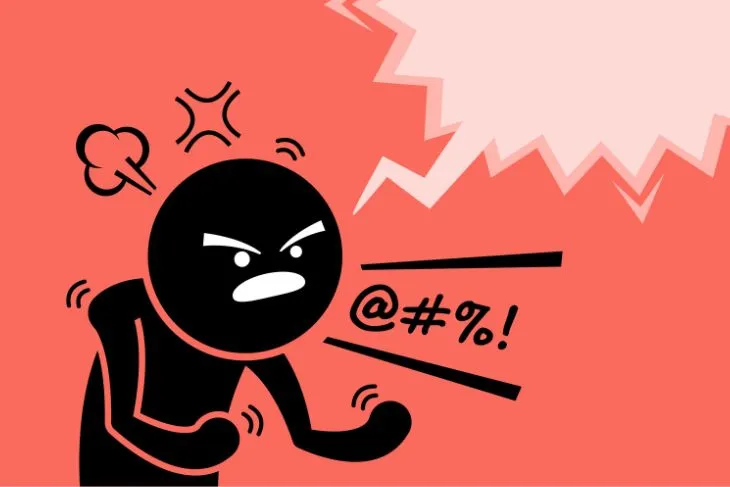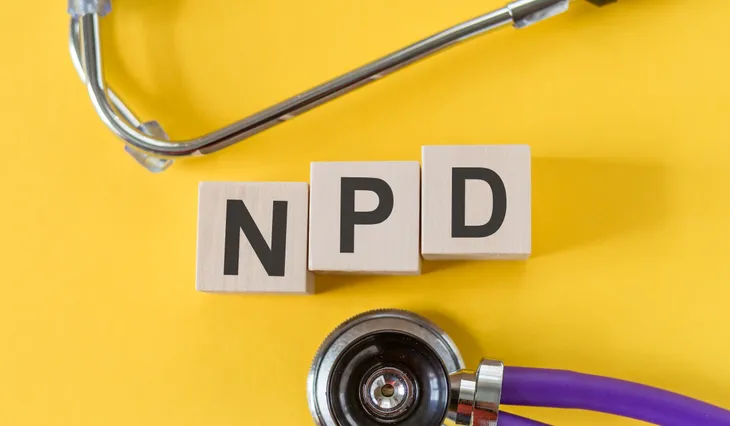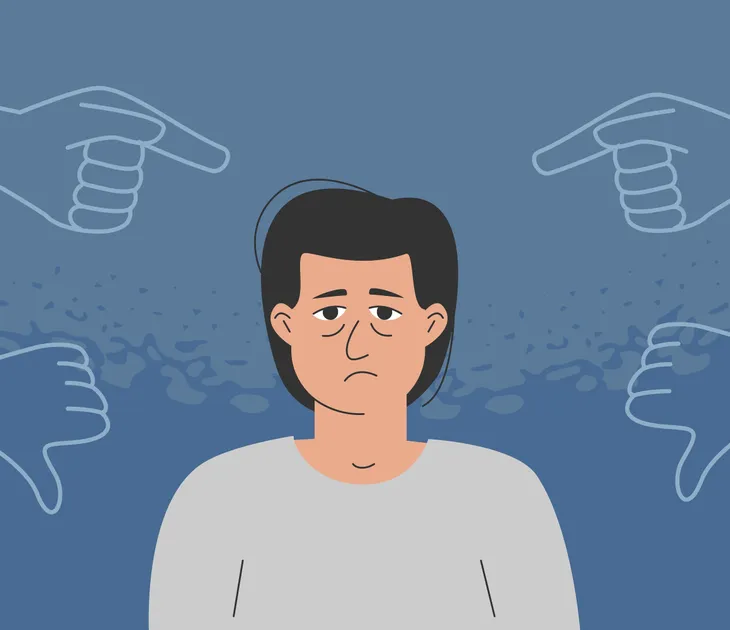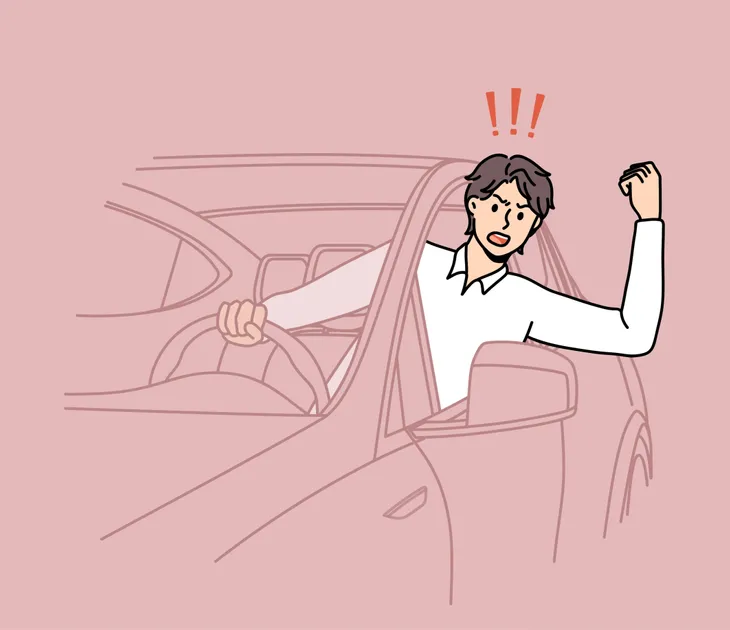- Narcissistic rage describes the sudden and intense outburst of anger, aggression, and violence displayed by a narcissist when faced with negative feedback.
- Common triggers are a challenge to their confidence, sense of self is questioned, or an injured self-esteem.
- The best way to deal with narcissistic rage is to walk away and set boundaries.
- Treatment can only be obtained from a mental health professional, usually through talk therapy.
We all get angry from time to time, and some of us might even experience rage. But narcissistic rage occurs when someone with narcissistic personality disorder (NPD) has an outburst of intense anger or silence. The biggest difference is that this rage is often disproportionate to the perceived slight and occurs alongside symptoms of their personality disorder.
Despite them having an inflated sense of their own importance, it’s actually their thin skin and low self esteem that leads to these outbursts of anger. If you or someone you know has NPD and exhibits signs of narcissistic rage, here’s a look into all the common triggers, plus how to safely respond…
What is Narcissistic Rage?
Psychoanalyst Heinz Kohut coined the term “narcissistic rage” in the 1970s to describe the sudden and intense outburst of anger, aggression, and violence displayed by a narcissist when faced with negative feedback that causes discomfort and activates their defense mechanisms, explains Choosing Therapy. The range of rage associated with a narcissistic injury can vary from mild irritation to physical assault. As a result, the question of whether narcissists are dangerous is a valid concern, and appropriate caution if warranted.
When confronted with their own behavior, narcissists may respond with emotional, psychological, physical, or verbal abuse, says the source. One reason for this response is the fear of direct exposure and the potential threat to their false identity. To maintain their facade, Choosing Therapy warns that narcissists may resort to explosive reactions to deflect from the underlying issue.
Signs of Narcissistic Rage
Initially, narcissistic rage may not be noticeably distinct from other sudden emotional outbursts exhibited by friends or loved ones, says Choosing Therapy. However, repeated occurrences of such behavior can reveal patterns and trends.
Choosing Therapy lists the following as the top warning signs of narcissistic rage:
- An excessive display of anger disproportionate to the triggering stressor, sometimes bordering on hatred towards the victim.
- A sudden outburst of rage that may quickly dissipate and never be discussed again.
- Verbal or physical aggression towards another person or property as a result of the anger.
- Self-harm as a manifestation of the rage.
- Frustration stemming from the individual not getting their way, receiving inadequate attention, or failing to receive the desired amount of praise.
- Irritability triggered by criticism from loved ones or coworkers, getting caught in a lie, or feeling a loss of control.
The source also notes that observers may struggle to comprehend the correlation between triggers and the ensuring anger, particularly since the narcissist may attribute blame to external factors. Close scrutiny and analysis can expose signs of narcissistic rage.
Causes of Narcissistic Rage
Although the exact cause of NPD, which is often an underlying factor in narcissistic rage, is not yet understood, according to VeryWell Mind, it’s believed that a combination of genetics, upbringing, and life experiences contribute to its development.
If you or someone you know has NPD, it would be beneficial to have a deeper understanding of this disorder. Especially because NPD can have a significant impact on various aspects of an individual’s life and can present itself in different forms, explains VeryWell Mind. For example, as overt, covert, or even high-functioning, where the person may excel in their career despite struggling with the disorder, such as a high-powered business person prone to explosive fits of anger.
Trigger: Challenge to Their Confidence
Individuals with NPD typically attempt to bolster their self-assurance by consistently getting away with lies or creating false identities, explains Healthline. They are masters of manipulation and compulsive liars. They derive great satisfaction from being able to trick or manipulate others with their lies.
However, if someone exposes their vulnerabilities, people with NPD may experience feelings of inadequacy, warns Healthline. Such an unwelcome emotion may trigger them to respond with defensive and aggressive behavior, such as narcissistic rage.
Trigger: Sense of Self is Questioned
When others expose the fact that a person with NPD may not possess the skills or abilities they claim to have, it can pose a threat to their sense of self, explains Healthline. This challenge may trigger an aggressive and cutting outburst.
They will immediately go into defense and attack mode in order to try and preserve or regain control of the situation. Their desperation is what causes them to lash out in anger or rage.
Trigger: Injured Self-Esteem or Self-Worth
Although individuals with NPD may have an inflated sense of self, they often have fragile self-esteem that is easily wounded. According to Healthline, when they feel hurt or threatened, narcissists may respond with aggression as a defense mechanism.
They may resort to cutting someone out or using hurtful words or actions to protect their self-image, warns the source. This type of lashing out is in many ways not reasonable and oftentimes isn’t proportionate to the perceived slight.
How to Respond to Narcissistic Rage
When dealing with a narcissist, it can be challenging, especially when they’re exhibiting extreme rage. However, Choosing Therapy says it’s essential to recognize that it’s not advisable to engage with them in any way.
According to the source, the best course of action is to distance yourself physically and avoid any interaction with them. Remember to set your boundaries firmly since narcissists will attempt to manipulate you. If possible, show empathy and validation but prioritize removing yourself from the interaction altogether.
In a Relationship
It’s important to manage your expectations when dealing with a person who has NPD. While not all narcissists are the same and it’s possible for them to love and have successful relationships, Choosing Therapy warns there will be many challenges and obstacles to overcome. Set expectations low so there’s room to appreciate the good and tolerate the bad.
However, be mindful about whether the risks of having a partner with NPD outweigh the benefits. If this is the case, Choosing Therapy suggests ending the relationship. Personality disorders are typically static and stable, meaning that it’s unlikely for a narcissist to change. Attempting to fix a personality disorder alone is often a futile effort. Breaking up with a narcissist could be the best course of action.
At Work
It can be tricky to navigate dealing with narcissistic rage at work because it’s a professional setting. While at work people are held to a higher standard of behavior. Things can get even more difficult if the person in question is a superior or close team member.
To help, VeryWell Mind recommends verifying information provided to ensure you have the complete and accurate story. If it affects your work, speak with your manager or HR representative to report the situation. Be sure to report any workplace harassment incidents promptly and keep a record of all interactions. Lastly, the source suggests not being alone with that person.
From a Friend…
Similar to a romantic relationship, having a friend with narcissistic personality disorder can present some interesting difficulties. They may frequently request extravagant favors and consistently view their friends and acquaintances as inferior.
If confronted with narcissistic rage from a friend, Choosing Therapy recommends first leaving the situation promptly. At a later time, inform them that their behavior is unacceptable. Let a period of several days or weeks to go by for both parties to cool off before reconnecting. Make sure to set boundaries with them and make it clear their narcissistic rage will not be tolerated.
From a Stranger…
While an unpleasant interaction is never a good experience, the nice thing about having one with a stranger is that we can walk away without any guilt or obligation. VeryWell Mind’s advice for dealing with narcissistic rage from a strange is to walk away and refrain from engaging any further.
Another tip that might be helpful is to acknowledge that the altercation is not your responsibility and there is no obligation to remain and engage in that argument, adds the source.
Treatment for Narcissistic Rage
Seeking the help of a mental health professional can be effective in treating both narcissistic personality disorder and associated rage issues, says Healthline. Psychotherapy, also known as talk therapy, can assist individuals with NPD in comprehending their actions, decision-making, and subsequent outcomes. Therapists may then collaborate with the individual to tackle underlying issues.
Moreover, Healthline suggests that talk therapy can aid people with NPD in developing healthier coping mechanisms and interpersonal skills by devising new strategies for positive behavior.















